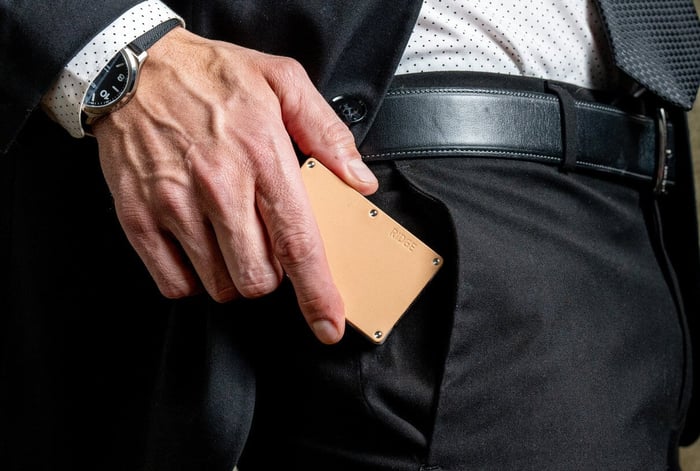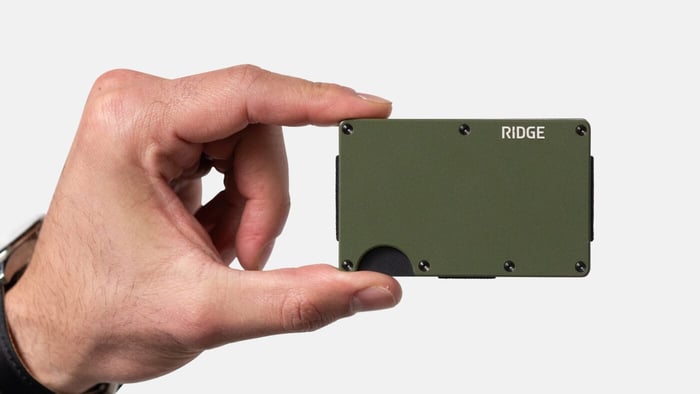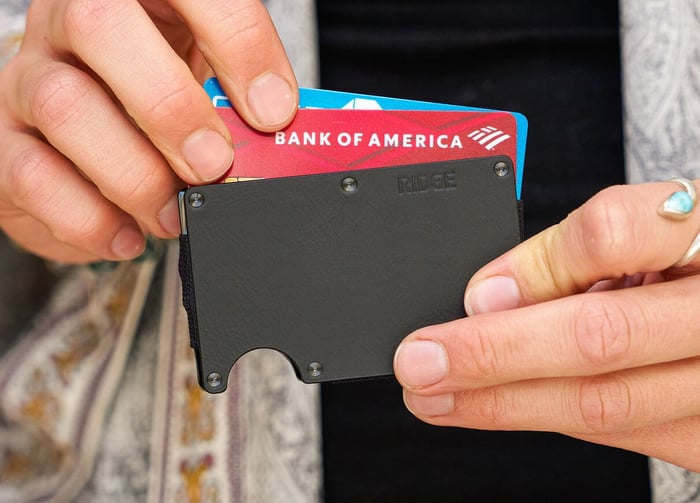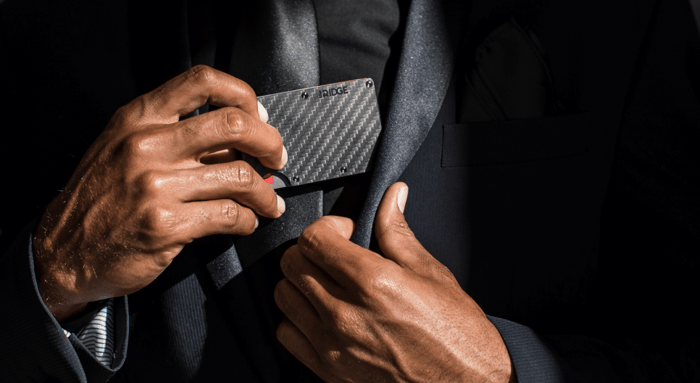In the modern world, there's an increased risk of cyber threats. Namely, criminals increasingly rely on RFID (Radio Frequency Identification) scanners to steal financial and personal information straight from the wallets of unsuspecting people. Many have turned to RFID blocking wallets as a preventive measure to combat this. This is predicted to become the norm in a few years. But how do RFID wallets work?
In this article, you'll learn about RFID technology, whether RFID wallets work, as well as the ins and outs of choosing one for security and data protection.
What Is RFID Technology?
Before figuring out whether RFID wallets work, we'll need to take a closer look at RFID technology. The system transmits signals through radio waves between a tag and a reader. Once the two components are close, users can retrieve data on the tag while operating the reader. As you might imagine, RFID technology can be helpful in many fields, such as inventory warehouse tracking, logistics, and even marketing campaigns. The system easily allows for data transfer without contact.
Unfortunately, RFID technology can also be used for credit card fraud and identification through a process known as "skimming." Credit cards, passports, and even IDs have embedded chips compatible with RFID scanners for contactless payment and identification. This makes them vulnerable to scanning, potentially allowing criminals to use your information for fraudulent transactions. This has created the need for RFID blocking technology.
The rising trend of RFID scanning thefts isn't common, but they can be devastating. For example, three men engaged in a fraudulent credit card scheme in 2022 in San Diego. They used RFID scanners to skim information and then created fake cards. They obtained the data of thousands of users, resulting in one million dollars of fraudulent claims.
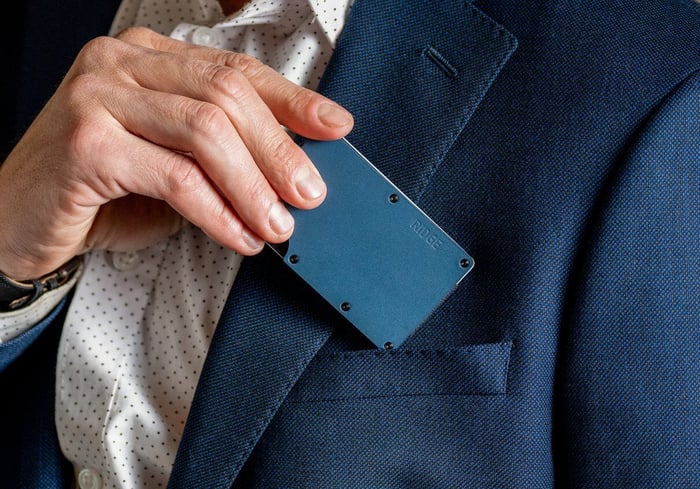
What Are RFID Wallets, and How Do They Work?
Many have been turning to RFID blocking wallets to combat credit card skimming. But before buying one to protect your information, you'll want to know precisely how RFID wallets work.
RFID blocking wallets are made from materials too thick for RFID scanning. Some examples include space-grade aluminum, stainless steel, or carbon fiber.
So how do RFID wallets work? These metals cancel out electromagnetic fields and radio waves, disrupting the reading process and thereby protecting your information. The wallet's design also creates a full enclosure, protecting credit cards and IDs from all angles. Using RFID blockers is especially useful for contactless cards as they typically have an RFID chip.
Testing the Effectiveness of RFID Wallets
While the concept of RFID wallets seems sound, many institutions and experts have conducted specific research to decide if RFID wallets work for efficiently protecting data.
For the most part, RFID blocking wallets do indeed stand up to tests by experts. In particular, MET laboratories, an independent researcher, used similar readers as hackers and criminals. MET used a 13.56 MHz RFID on an ordinary contactless credit card. After placing it in some popular RFID-blocking wallets, they found that they weren't able to read the information.
Types of RFID Wallets
In the digital age, criminals use increasingly complex and effective technology. By performing credit card skimming, they can quickly obtain information and replicate it to make fraudulent claims. This is what makes RFID blocking wallets so relevant in the digital age. They allow you to simply store your credit cards and IDs without risking electronic pickpocketing. However, there are many types of RFID blocking wallets. Some advertise this technology as their main feature, while others have other valuable benefits too.
Biometric Wallets
Evolving technology allows us to take security a step further. For example, biometric wallets use cutting-edge technology, fingerprint authentication, and RFID-blocking features for maximum protection. Biometric wallets have been gaining in popularity with cryptocurrency users. However, companies like D'CENT have a display and fingerprint identification alongside cryptocurrency support. As the need for advanced security rises, we can expect to see more state-of-the-art biometric wallets like these.
Carbon Fiber and Metal Wallets
Some wallets rely mostly on their material for security. This strategy is simple yet effective. In particular, carbon fiber and stainless steel are especially efficient in providing top-notch RFID blocking.
This is due to the innate properties of these materials. Carbon fiber disrupts the radio waves necessary for RFID information transmission. Likewise, it's highly durable and corrosion-resistant while staying especially lightweight.
For example, Ridge wallets have a wide range of materials, all optimal for RFID blocking. Some examples include space-grade aluminum, stainless steel, and carbon fiber. Next to being durable, the Ridge features a sleek design that simplifies everyday carry.
Besides the Ridge, other metal wallet choices include Dango, Fidelo, and Trayvax.
Leather and Fabric Wallets
RFID blocking wallets are usually made from metals like those mentioned above. However, some prefer the traditional look and appeal of a leather wallet. This is a classical design, so it's no wonder many companies specializing in RFID-blocking features also have leather options. Even the Ridge has wallets that have softer finishes with metal elements underneath.
For example, Timberland and Fossil have various genuine leather wallets that still do a good job of blocking scanners. Typically, these companies will use leather with a metal backing or a stainless steel fabric to block radio waves as metal versions do.
Credit Card and Passport Sleeves
Some prefer a simpler approach to protecting their information. Instead of using a full RFID-blocking wallet, you can purchase a credit card or passport sleeve with the same feature. These sleeves are more focused on protecting important information on your documents. Passport sleeves are much larger, allowing you to carry your identification easily. However, their size is also a disadvantage as they can't fit in your pocket like metal wallets can.
Some brands that offer effective passport and credit card sleeves include Travelon, Bellroy, and PacSafe.
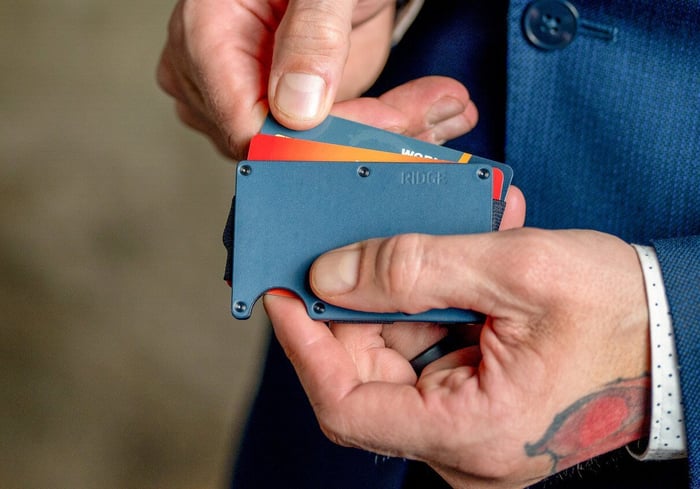
Debunking Myths About RFID Wallets
While RFID blocking wallets can be incredibly useful for protecting your security, there are some myths associated with these types of wallets. If you're considering purchasing one, you'll need first to consider its effectiveness and whether you really need one.
Myth 1: All RFID Wallets Provide 100% Protection
Many ask the question: Do RFID blocking wallets really work? The answer is yes, they do, but not 100% of the time. Certain factors can impact their overall effectiveness, such as the quality of the wallet, condition, and brand.
RFID-blocking wallets evolved as a response to RFID credit card skimming. For the most part, they're designed to block scanners at a certain frequency level that we're used to seeing. If criminals start using higher-powered scanners or technology progresses, some wallets on the market might be rendered less effective. Since RFID crimes aren't that common, many even wonder, are RFID wallets necessary?
For the best RFID wallet, look for one with a complete design, covering your credit cards and your Ids totally. Material is another consideration. Carbon fiber is usually the best option.
Myth 2: Everyone With an RFID Card Needs an RFID Wallet
Many credit cards these days come with RFID blocking wallets. While this might be alarming, that doesn't mean that credit card skimming is a high-probability threat. Typically, you'll have to consider your exposure to certain environments and risk profiles. The reason being that credit card skimmers will usually search for places where you'll be pulling out your credit card or passport.
Revealing the Facts About RFID Wallets
Before buying an RFID wallet and finding out do RFID wallets work for you, there are some things you need to consider, including the quality and design of the product as well as its part in a larger security issue.
Fact 1: Quality and Design Matter
An RFID wallet is only as effective as the quality of its design. So how to tell if a wallet is RFID? While some brands claim to provide this feature, not all of them work. The wallets you choose should be made from stainless steel or carbon fiber. Carbon fiber can be relatively light, so don't let overly heavy products fool you into thinking they're quality. Your best bet is to stay away from knockoffs.
Fact 2: RFID Wallets Are a Piece of a Larger Security Puzzle
RFID wallets are a step ahead regarding security. However, they should only be one line of defense for protecting your data security. There are other preventive measures too. Make sure to regularly update and change your security codes and passwords, use secure networks, and monitor your account and bank statements for any fraudulent claims.
Securing Your Pocket: The Ridge Way
When answering the "Do RFID wallets work?" question, you must consider the wallet's quality and design. While they can be particularly useful, that doesn't mean they're 100% effective.
For the best RFID blocking wallet on the market, visit The Ridge. You can choose from multiple RFID blocking wallets made from the most durable materials like carbon fiber and stainless steel. Next to protecting your credit card details and debit cards from electromagnetic signals and identity theft, they also allow you to look stylish as well.
FAQs
Do you really need an RFID wallet?
If you're concerned about security and cyber criminals stealing your credit card information and identification, an RFID wallet can give you peace of mind. While the chances are still pretty rare, it can't hurt to be safe.
Is RFID blocking a real thing?
RFID blocking technology is a real form of technological protection. It shields your sensitive credit card information from being scanned by criminals using an RFID card reader. This enhanced security is essential to many metal wallets like the Ridge.
Can RFID wallets go through airport security?
RFID blocking wallets can go through X-rays and airport security without causing an issue. X-ray use is at the opposite end of the electromagnetic field. Simply inform the security personnel that you're using a metal wallet to avoid confusion.
Do RFID blocking wallets mess up my cards?
Assuming that you've chosen a legitimate RFID-blocking metal wallet, your credit cards should fit snugly inside without damage. However, you should beware of knockoffs. Some users have mentioned that some of these wallets have sharp metal edges that can potentially scratch cards and tear paper bills.

Evan Grimm, Writer
Evan Grimm is a practical writer, blogger, editor, and knowledgeable up-and-coming authority in the outdoor realm. His best-known content is published on Bowhunting.com, The Alaska Frontier, and Exodus Outdoor Gear. He and his family reside in central Alaska, where daily common sense and practicality are necessary. His commercial pilot and aircraft technician certifications make him focus on what is relevant and solidly provable. You will find him writing or proving more content.






















